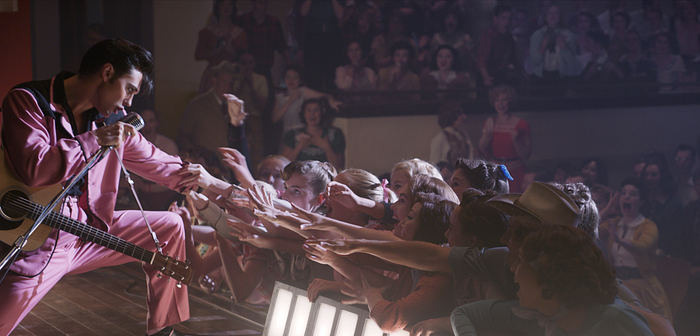‘Elvis’ (2022) Review: The Man, The Myth, and The Legend’s Many Problems

Bedazzled jumpsuits, hip wiggles, and fans dying to get their hands on the King of Rock and Roll. In Baz Luhrmann’s Elvis, a musical drama that puts the life of Elvis Presley (Austin Butler) on screen. Grandness and theatricality are always present in Luhrmann’s movies, and this drama is scattered with those elements. However, even with the grandiosity and head-spinning camera techniques, the homage to Elvis is only told from the perspective of the musician’s manager Colonel Tom Parker (Tom Hanks). The musician’s voice is completely absent in the movie, except for Butler’s presence to show his artistry, but centring his manager’s side of the story seems less than a reflection of the musician’s life.
The movie begins with the narration by the Colonel after waking up in a hospital and declaring that he is not the liar and the villain of the story. He is Elvis’ maker. At the brink of death, the Colonel goes back to the beginning when he discovers the young hip-wiggling Elvis Presley in Memphis. While trying to find an opening act for Hank Snow (David Wenham), his son Jimmie Rogers Snow (Kodi Smit-McPhee) suggests a singer by the name of Elvis Presley, and chaos ensues. Young women are enthralled by his dance movements and wiggling, and the Colonel sees an opportunity to take Elvis under his management. After signing a contract with the Colonel, Elvis performs onstage and his star power slowly begins to rise. However, the Colonel has secrets that he doesn’t wish anyone to know and it causes a lot of trouble. Elvis wishes to perform on international stages, and the Colonel does everything in his power to stop his young act from going abroad, all to exploit him financially.
The only good thing that results in Elvis is Butler’s electrifying performance. He takes on the impossible role and re-creates Elvis’ hip wiggles, his accent, and sings most of the musician’s songs. All of the performances are physically challenging and Butler seems to be enjoying every bit of it. However, the story and character of Elvis seem to get lost in the spectacle of telling it in the most authentic way possible. Or, is it authentic when the narrator is not Elvis himself telling his story but the man who destroyed his life?

For the most part, Elvis explores the many controversies he had to go through during his career. The courtship between him and an underage Priscilla (Olivia DeJonge), his refusal to stop his provocative dance movements because the white conservative audiences were uncomfortable, and the appropriation of Black culture and music. Most of them are explored on a surface level, especially his marriage to Priscilla and his supposed appreciation of Black gospel music. The latter is shown in sequences of Elvis growing up in a Black neighbourhood due to poverty and discovering music with his friends. In other scenes, Elvis meets B.B. King (Kelvin Harrison Jr.) after feeling like he has lost control of his career due to the Colonel’s dominance. B.B. is mostly there to reassure and support him, and in a sense, to cheer him up. Other Black artists like Big Mamma Thornton (the late Shoka Dukureh) and Little Richard (Alton Mason) are only there to be a lip-service to Elvis’ rising career. Instead of indicating that Elvis had repeatedly stolen Black musicians’ songs in his career, Luhrmann suggests that he appreciates their culture and music. For first-time viewers who know nothing about Elvis’ career, they might believe that Elvis embraced the songs made by Black artists in his earlier years. This decision to not explore the roots of his legacy distorts the movie’s authenticity, but perhaps Luhrmann was more focused on style over substance, and he deals with Elvis and Priscilla’s relationship just the same.

The director completely brushes over the age gap between the musician and his young wife. Priscilla was only 14 when they met in Germany, and the scene where she drives through a sea of female fans to meet him at his home reads like a romantic fairytale. This continued with a “fairytale wedding,” and Luhrmann never mentions the age gap. Her storyline gets bogged down into a tragic story of a wife and mother who watches her husband drown himself with pills and drugs. Their romance, or whatever it is, slowly breaks apart. The movie shows how little he cares for Priscilla and that his stardom had ruined the dignity of their ‘marriage.’
Elvis has many problems, but Luhrmann’s decision to exclude these details of Elvis’ life and career hurts any kind of authenticity that is left. Showing the grandiosity of Elvis’ career was the right path for Luhrmann, but it paints him as a hero rather than a man who groomed an underage girl and whitewashed Black culture and music. Even with the runtime of two hours and 29 minutes, the movie is exhausting to watch with fast camera movements and harsh zooms that are bound to make viewers dizzy. Elvis’ problems begin the moment the story starts by not focusing on the subject and rather on the villain who was widely known to have stolen and exploited Elvis to pay off the Colonel’s gambling debt. The ending, narrated by the Colonel, completely removes him from all the wrongdoings. Luhrmann overlooks a lot of the horrible things that happened during his legacy to create a version that is worthy of the big screen. The movie has no interest in showing who Elvis is, but rather focuses on the Colonel’s story. It creates a false reflection of Elvis’ reality all for the purpose of entertainment, resulting in a bloated biographical drama.
